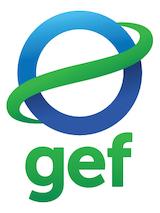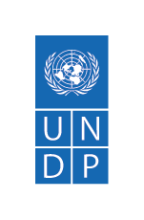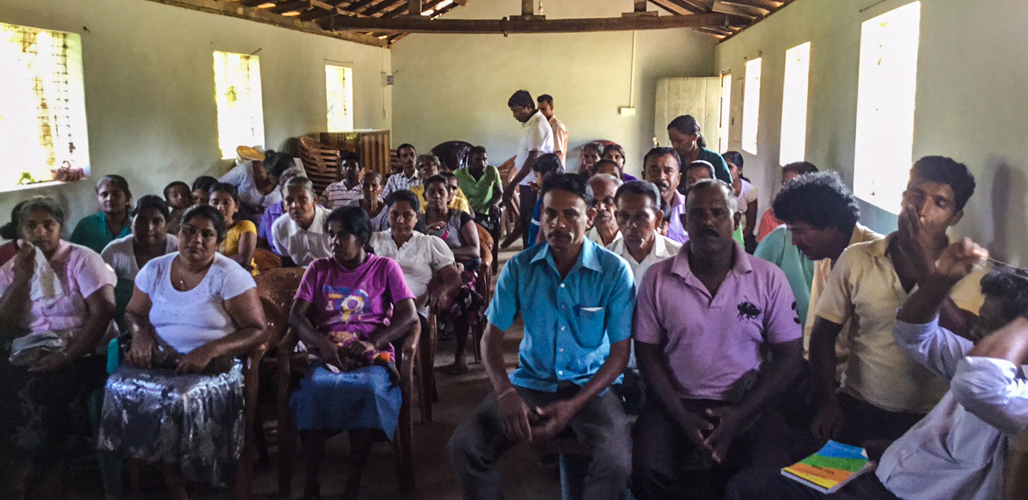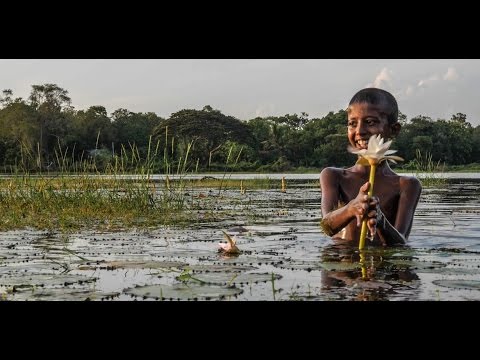Strengthening the resilience of post-conflict recovery and development to climate change risks in Sri Lanka
Sri Lanka’s 30-year long armed conflict has had significant impacts on the population including in the Northern Province and Eastern Province. Most aspects of life have suffered: People have been displaced, institutions disintegrated, and essential communal and public infrastructure damaged. People could no longer access markets as they once had and the transport of goods virtually came to a halt. Once-industrious communities that had produced lush harvests of rice, vegetables, fruits, and other crash crops became impoverished.
The key objective of this project (2013-2018) was to increase the resilience of communities to climate change-induced hazards through integration of climate-smart policies and actions into development planning and budgeting, including in the reconstruction and rehabilitation programmes in the Northern Province and Eastern Province.
Project details
Levels of intervention
- Community
Source of funds
- Global Environment Facility - Special Climate Change Fund
Key implementers
- National Governments
Funding amounts
Project partners
- Ministry of Economic Development, Sri Lanka
- Ministry of Environment, Sri Lanka
- Ministry of Disaster Management, Sri Lanka
- Finance Commission of Sri Lanka
- United Nations Development Programme (UNDP)
- Global Environment Facility (GEF)
Introduction
Sri Lanka’s 30-year long armed conflict has had significant impacts on the population including in the Northern Province and Eastern Province. Most aspects of life have suffered: People have been displaced, institutions disintegrated, and essential communal and public infrastructure damaged. People could no longer access markets as they once had and the transport of goods virtually came to a halt. Once-industrious communities that had produced lush harvests of rice, vegetables, fruits, and other crash crops became impoverished.
The key objective of this project (2013-2018) was to increase the resilience of communities to climate change-induced hazards through integration of climate-smart policies and actions into development planning and budgeting, including in the reconstruction and rehabilitation programmes in the Northern Province and Eastern Province.






Project details
The proposed project will significantly strengthen the capability of key provinces in the context of Sri Lanka’s emergence from the 30-year conflict to develop and implement local climate strategies and climate-smart investment plans which are aligned with the National Climate Change Adaptation Strategy and preserve development progress achieved under the Mahinda Chintana. Through a combination of policy, institutional and investment measures, the project serves to promote climate resilient planning and investment beyond its immediate lifetime.
At the local level, institutions such as municipal councils, urban councils and Pradeshiya Sabhas will be enabled to apply visual planning tools and instruments (such as hazard, vulnerability and natural resources maps) to recognize climate-related risks that may negatively affect a particular planning endeavor in a specific location. Local authorities will learn to recognize the difference between a building that has been conceptualized on the basis of traditional knowledge, and one that can effectively withstand the impact of a more variable climate with greater temperature differences and increasing intensity of storms, floods and landslides. Communities in all coastal districts of vulnerable provinces will benefit from concrete investments in climate-resilient communal water supply, and recognize the value of intact ecosystems in protecting their investments. In its promotion of community-based adaptation at the local level, the project recognizes that risks associated with climate change threaten to reinforce gender inequalities and erode progress that has been made towards gender equality and women’s empowerment. Poor women’s limited access to resources, restricted rights, limited mobility and voice in community and household decision-making can make them much more vulnerable than men to the effects of climate change. This is unfair and can lead to unfortunate consequences for all, as women play a unique role in the stewardship of natural resources and support to households and communities. With their knowledge, they can shape adaptive mechanisms in vulnerable areas. When promoting climate resilient planning in the context of village development plans, training local authorities and stakeholders on the application of climate change adaptation strategies, and planning community-based adaptation activities in coastal areas, this SCCF project will take gender equality considerations, as well as men’s and women’s different needs, perspectives and knowledge, into account.
At the sub-national level, members of Provincial Councils, Provincial Planning Secretariats, officials in provincial sector ministries and provincial departments, and members of the District Administration will learn to ask informed questions about climate and disaster risk in the context of annual investment planning. Engineers, urban and rural development planners, NGOs supporting community development efforts, and private sector entities engaged in reconstruction tasks will learn how to practically apply climate resilient building codes and land-use plans, and how to harness the services and functionalities of natural ecosystems in the context of flood protection and integrated water resources management.
- Community
- National Governments
Communities in the Northern and Eastern Provinces of Sri Lanka
- Ministry of Economic Development, Sri Lanka
- Ministry of Environment, Sri Lanka
- Ministry of Disaster Management, Sri Lanka
- Finance Commission of Sri Lanka
- United Nations Development Programme (UNDP)
- Global Environment Facility (GEF)
News
Key results and output
Outcome1. Reconstruction and development programmes in the Northern Province and Eastern Province integrate climate risk information and adaptation measures
- Output 1.1 Integrated map-based assessment of climate-related hazards, vulnerabilities and climate-sensitive natural resources available in all districts of the Northern Province and Eastern Province
- Output 1.2 Disaster resilient infrastructure development controls and building codes applied in key reconstruction, resettlement and development programmes to reduce losses and damage from climate-induced hazards
- Output 1.3 Land use plans for key resettlement and infrastructure programmes in the Northern Province and Eastern Province revised on the basis of climate scenarios to reduce damages from climate-induced hazards (sea level rise, flooding, erosion, storms, salinisation of soils and aquifers)
Outcome 2 Design, appraisal and approval processes for provincial and communal development plans integrate climate risk considerations
- Output 2.1 Provincial councils, local authorities, district planning units and officers of the Ministry of Economic Development, Finance Comission, Central Environment Authority and National Housing Development Authority trained to recognize climate risk problems in new investment projects and apply and/or recommend targeted risk reduction and risk management measures
- Output 2.2 Training programme for structural engineers, urban and rural infrastructure planners and teaching staff from technical colleges and vocational training institutes on climate-resilient construction, land use and water resources planning
Outcome 3 Investment programme defined and implemented to increase the resilience of communal development plans from climate change-induced risks
- Output 3.1 Restoration and rehabilitation of natural buffer zones (mangrove greenbelts, sand dunes, natural wetlands) in at least 3 climate risk vulnerability hot spots to protect community reconstruction and development efforts in the coastal belt
- Output 3.2 Revise and adjust at least 30 communal development plans to take into consideration the effects of climate induced flooding and drought through targeted adaptation measures (such as communal rainwater harvesting, flood-proofing of communal water infrastructure, adoption of drought-resistant crops)
Reports & publications
Videos & multimedia
Monitoring & evaluation
Project Start:
Project Inception Workshop: will be held within the first 2 months of project start with those with assigned roles in the project organization structure, UNDP country office and where appropriate/feasible regional technical policy and programme advisors as well as other stakeholders. The Inception Workshop is crucial to building ownership for the project results and to plan the first year annual work plan.
Daily:
Day to day monitoring of implementation progress: will be the responsibility of the Project Manager, based on the project's Annual Work Plan and its indicators, with overall guidance from the Project Director. The Project Team will inform the UNDP-CO of any delays or difficulties faced during implementation so that the appropriate support or corrective measures can be adopted in a timely and remedial fashion.
Quarterly:
Project Progress Reports (PPR): quarterly reports will be assembled based on the information recorded and monitored in the UNDP Enhanced Results Based Management Platform. Risk analysis will be logged and regularly updated in ATLAS.
Annually:
Annual Project Review/Project Implementation Reports (APR/PIR): This key report is prepared to monitor progress made since project start and in particular for the previous reporting period (30 June to 1 July). The APR/PIR combines both UNDP and GEF reporting requirements.
Periodic Monitoring through Site Visits:
UNDP CO and the UNDP RCU will conduct visits to project sites based on the agreed schedule in the project's Inception Report/Annual Work Plan to assess first hand project progress. Other members of the Project Board may also join these visits. A Field Visit Report/BTOR will be prepared by the CO and UNDP RCU and will be circulated no less than one month after the visit to the project team and Project Board members.
Mid-Term of Project Cycle:
Mid-Term Evaluation: will determine progress being made toward the achievement of outcomes and will identify course correction if needed. It will focus on the effectiveness, efficiency and timeliness of project implementation; will highlight issues requiring decisions and actions; and will present initial lessons learned about project design, implementation and management. Findings of this review will be incorporated as recommendations for enhanced implementation during the final half of the project's term.
End of Project:
Final Evaluation: will take place three months prior to the final Project Board meeting and will be undertaken in accordance with UNDP and GEF guidance. The final evaluation will focus on the delivery of the project’s results as initially planned (and as corrected after the mid-term evaluation, if any such correction took place). The final evaluation will look at impact and sustainability of results, including the contribution to capacity development and the achievement of global environmental benefits/goals. The Terminal Evaluation should also provide recommendations for follow-up activities.
Project Terminal Report: This comprehensive report will summarize the results achieved (objectives, outcomes, outputs), lessons learned, problems met and areas where results may not have been achieved. It will also lie out recommendations for any further steps that may need to be taken to ensure sustainability and replicability of the project's results.
Learning and Knowledge Sharing:
Results from the project will be disseminated within and beyond the project intervention zone through existing information sharing networks and forums.
The project will identify and participate, as relevant and appropriate, in scientific, policy-based and/or any other networks, which may be of benefit to project implementation though lessons learned. The project will identify, analyze, and share lessons learned that might be beneficial in the design and implementation of similar future projects.
Establish a two-way flow of information between this project and other projects of a similar focus.


